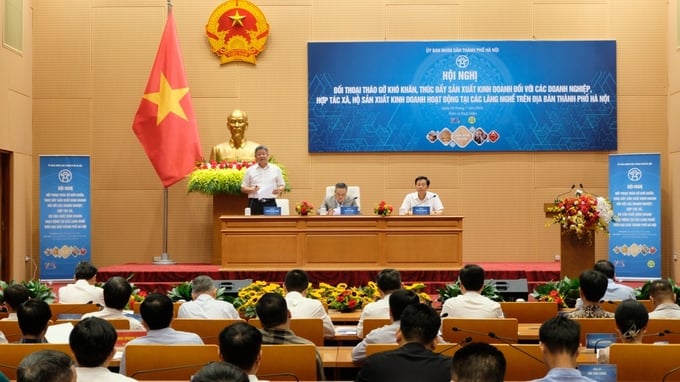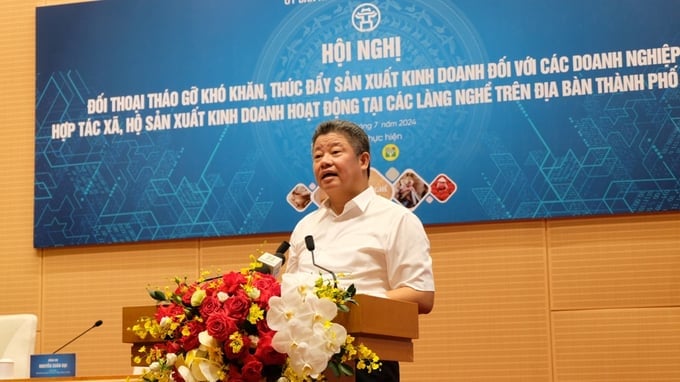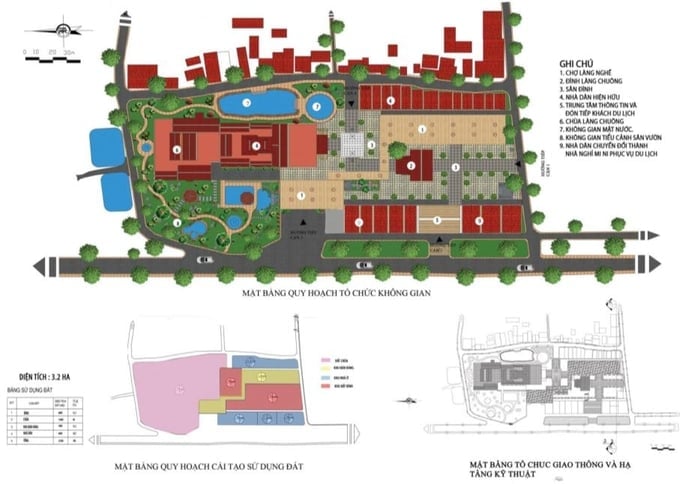June 16, 2025 | 10:56 GMT +7
June 16, 2025 | 10:56 GMT +7
Hotline: 0913.378.918
June 16, 2025 | 10:56 GMT +7
Hotline: 0913.378.918

Chairman of Hanoi People's Committee Tran Sy Thanh, Vice Chairman Nguyen Manh Quyen, and General Director of Hanoi city's Department of Agriculture and Rural Development Nguyen Xuan Dai co-chaired the conference. Photo: Tung Nguyen.
Hanoi People's Committee organized a conference on July 5, 2024, to address challenges and promote business activities for businesses, cooperatives, and production households operating in craft villages across the city.
The conference was chaired by Tran Sy Thanh, Deputy Secretary of the City Party Committee and Chairman of the Hanoi People's Committee. The event saw the participation of representatives from various associations and 136 businesses, cooperatives, production households from the city's craft villages.
Vice Chairman of Hanoi People's Committee Nguyen Manh Quyen stated: "Craft villages are actively contributing to the economic restructuring and rural economic development process; and establishing a foundation for the successful implementation of the One Commune One Product (OCOP) program and the new rural construction program in the city."
Hanoi, known as the "Land of a Hundred Crafts," accounts for 56% of the country's total number of craft villages. The city currently houses 1,350 craft villages, including 331 recognized traditional craft villages, which represent 47 out of the 52 traditional crafts nationwide. These villages are distributed across 25 districts, towns, and communes within Hanoi city.
Consequently, the conservation and development of craft villages in association with cultural, agricultural, and rural tourism offer multi-valued economic benefits to the local community. The conservation and development of craft villages involve preserving cultural spaces as well as flexibly integrating these villages into new rural development policies.

Vice Chairman Nguyen Manh Quyen delivering the opening speech at the conference. Photo: Tung Nguyen.
Annual revenue from craft villages has been estimated at over 24,000 billion VND. Notably, the villages offer a diverse range of aesthetically appealing and high-quality products, with some possessing competitive advantages in both domestic and international markets. Each craft village boasts its own unique identity, producing exquisite and culturally rich products that deliver increasingly significant economic benefits to rural workers, particularly women and disadvantaged laborers.
Despite these encouraging achievements, businesses, cooperatives, and production households operating in craft villages face numerous challenges. The conference addressed and resolved questions across three main areas: craft villages' planning, infrastructure, tourism, and environment; support mechanisms and policies for craft villages; science and technology, trade promotion, brand building, and linkage between raw material regions.
Hanoi People's Committee acknowledged that the aforementioned recommendations and proposals are practical solutions for the capital's various levels and sectors.
Accordingly, the city is focusing on implementing the revised Law on the Capital, which provides an opportunity to introduce drastic and specialized mechanisms, policies that promote the sustainable conservation and development of craft villages in Hanoi.
The city also pledges to accompanying businesses and the local community in building a civilized, modern capital, with the core values of: "Supporting government - Contributing businesses - Trusting society - Happy people."

The planning for the renovation of public spaces, religious and service centers in Chuong Village, Thanh Oai District, Hanoi city, will follow a multi-functional conservation approach for the traditional conical hat craft village, thereby promoting value chain linkages in production regions.
According to representatives from the Hanoi city's Department of Planning and Architecture, the city is drafting two plans: the Capital Planning for the years between 2021 and 2030, with a vision towards 2050; and adjustments to the General Capital Planning until 2045, with a vision towards 2065.
These plans include new development directions and adjustments for urban and rural development, with a focus on conserving heritage sites, craft villages, traditional villages, cultural and historical relics, natural landscapes, and economic values. Furthermore, these factors will be developed in association with tourism and commercial services.
Additionally, industrial clusters within craft villages will be developed into spaces for displaying, introducing, and promoting craft village products, thereby creating cultural tourism spaces for traditional crafts. The city will also establish centers for introducing and exhibiting traditional handicraft products with international significance. On the other hand, Hanoi will maintain a clear delineation between residential and agricultural production areas with the aim of preserving land reserves for future development.
The development of traditional craft villages, cultural and industrial products, and spaces for showcasing traditional handicrafts will promote tourism and enhance international competitiveness. The city will also develop high-tech agricultural rural spaces following the urban agricultural village model; and establish the "village in the city" model, traditional Northern Vietnamese village cultural space model, and craft village cultural space model with the aim of preserving traditional culture.
The Capital Planning for the years between 2021 and 2030, with a vision towards 2050, has been submitted to the Prime Minister and the Ministry of Planning and Investment by the Hanoi People's Committee under Report No. 139/TTr-UBND dated May 17, 2024. The adjustments to the General Capital Planning until 2045, with a vision towards 2065, has been submitted to the Prime Minister and the Ministry of Construction under Report No. 140/TTr-UBND dated May 17, 2024.
Translated by Nguyen Hai Long
![Turning wind and rain into action: [4] Bringing climate bulletins to remote and isolated areas](https://t.ex-cdn.com/nongnghiepmoitruong.vn/608w/files/linhnhp/2025/06/14/1152-z6704423696987_15fd32ffc26d590d204d520c9dac6786-nongnghiep-151141.jpg)
(VAN) The Vietnam Agriculture and Nature Newspaper interviewed Mr. Vu Thai Truong, Acting Head of Climate Change and Environment at UNDP Vietnam, to gain deeper insight into how climate bulletins are delivered to farmers.

(VAN) In Tien Giang, a high-tech shrimp farm has developed a distinctive energy-saving farming model that has yielded promising results.
![Turning wind and rain into action: [3] 300.000 farmers benefit from agro-climatic bulletins](https://t.ex-cdn.com/nongnghiepmoitruong.vn/608w/files/news/2025/06/12/e5a48259d6a262fc3bb3-nongnghiep-125122.jpg)
(VAN) The agro-climatic bulletin has become a valuable tool for farmers in the Mekong Delta. After more than five years of implementation, the initiative is gradually being expanded nationwide.
![Turning wind and rain into action: [2] Providing forecasts to the people](https://t.ex-cdn.com/nongnghiepmoitruong.vn/608w/files/news/2025/06/12/e5a48259d6a262fc3bb3-nongnghiep-103927.jpg)
(VAN) In addition to improving the quality of hydrometeorological forecasts, putting forecast bulletins into practical use is crucial for production and disaster prevention.

(VAN) Blue carbon is receiving attention for its rapid absorption capacity and vast potential. It represents a promising nature-based solution to respond to climate change.
/2025/06/11/3507-1-161904_583.jpg)
(VAN) Seagrass beds and coral reefs serve as 'cradles' that nurture life in the ocean depths, creating rich aquatic resources in Vietnamese waters.
![Turning wind and rain into action: [1] Forecasting for farmers](https://t.ex-cdn.com/nongnghiepmoitruong.vn/608w/files/news/2025/06/11/e5a48259d6a262fc3bb3-nongnghiep-111919.jpg)
(VAN) Weather is no longer just a matter of fate. Forecasts have now become an essential companion for farmers in every crop season.